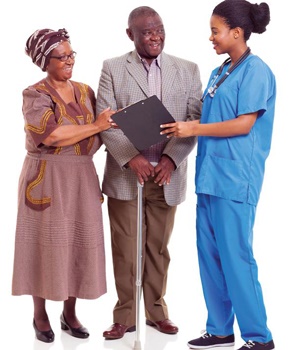
May 12 was International Nurses’ Day. Vyjayanthimala van Heerden, a clinical nursing lecturer and professional nurse at the Somerset Hospital in Cape Town, answers a few questions about this challenging but rewarding career.
Why did you want to become a nurse?
For me, it is a calling rather than a profession. For as long as I can remember, I’ve always wanted to care for the sick.
I have been a nurse for 24 years.
What do you enjoy most about nursing?
To help people in need and the passion that nurses show the patients they care for.
It is important for nurses to listen to their patients, and show patience and compassion.
What do you find most challenging?
To see a patient’s condition deteriorating over the years.
I have seen first-hand how diseases affect the lives of many people.
What did you have to study to become a nurse?
To be a professional nurse and midwife, you need a BA degree in nursing and midwifery.
To be a registered staff nurse, you need a diploma in nursing. To be a nursing aide, you need a higher certificate in auxiliary nursing.
Describe your typical working day.
My day starts at a quarter to seven. My first task is to ensure that the night staff bring the day staff fully up to date on the condition of all the patients.
Then I plan and check the daily activity list for the staff under my supervision.
I evaluate and draw up programmes to improve medical practices for the patients’ wellbeing.
I act as a source of information for the people around me, and evaluate and set goals for educational programmes. I give ongoing guidance and investigate methods for improving patient care.
Is nursing more technical and specialised than people think?
Yes, today’s nurses are more specialised.
The nursing industry, once dominated by women, nowadays incorporates men without any stigma.
Education and clinical experience have ensured that nurses stay at the forefront of their profession from the moment they graduate until they retire.
What are your future plans?
I want to change the basis of nursing so as to show even more compassion for both patients and the staff who serve those patients.
As a clinical nurse, I am required to attend the local training sessions of the Western Cape health department. These sessions teach me how to improve my patient care constantly, and how to use and maintain the best medical practices.
What advice do you have for young people who want to enter nursing?
It is essential for you to have a disposition to serve and always to be compassionate. Read about the career and work hard on your academic marks.
How to become a nurse in SA
The SA Nursing Council (sanc.co.za) has a huge database of institutions that offer nursing degrees or diplomas.
However, these are the basic academic requirements you need to become a nurse:
A matriculation certificate is the minimum admission requirement for college study.
The admission requirements for university are a matriculation exemption (some universities require certain subjects, such as biology, physical science or mathematics). As there are different academic requirements, it would be best to contact the specific training institutions involved.
What training does a university offer?
Universities offer a basic, four-year, full-time undergraduate degree (BCur) that prepares students in four career fields, namely general nursing (caring for people in hospitals, clinics and private practices); community nursing (primary healthcare and the prevention of disease in the community); psychiatric nursing (treating the mental health of individuals); and midwifery (caring for mothers and babies).
Clinical (practical) nursing experience is obtained at hospitals and other health services during the four years of study. Universities also offer post-basic qualifications at diploma, degree, master’s and doctoral levels.
What training does a college of nursing offer?
There are public and private nursing colleges, and the most common courses they offer are: a four-year diploma leading to registration as a nurse (general, psychiatric, community or midwifery); a two-year bridging course; one-year courses; and post-basic diplomas.
What courses will I study?
A student can expect to study fundamental subjects such as anatomy and physiology, behavioural sciences, nursing, midwifery, and community and psychiatric nursing.




 Publications
Publications
 Partners
Partners








